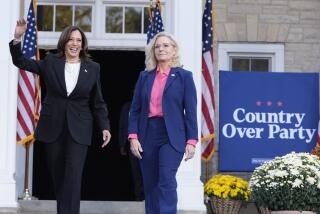Bush-Cheney Team Debuts on Trail
- Share via
CASPER, Wyo. — Dick Cheney’s first day on the campaign trail as the presumed Republican nominee for vice president was equal parts self-defense and celebration, hard questions about his voting record in Congress followed by a hometown rally in his former high school gym.
Cheney and George W. Bush, the presumptive Republican presidential nominee, made their maiden campaign voyage together Wednesday to this small town in the vast Wyoming prairie to showcase both men’s Western roots and their allegiance to America’s bedrock values.
We’re “straightforward,” the Texas governor told a cheering crowd of more than 1,000, and “direct.” If you’re looking for the real Dick Cheney, look no further than Natrona County High, where the former secretary of Defense was ignored for years by wife Lynne, then homecoming queen and a championship baton twirler.
Cheney “is a man who knows Washington well, but is not of Washington, and thankfully so,” Bush declared, “because Washington today is a place full of knee-jerk partisan shouting, a place of nightly polls and daily attacks.”
But no matter how much the political newlyweds wanted otherwise, Wednesday ended up more about Washington than Wyoming; Cheney fielded repeated questions about the actions he took during 10 years on Capitol Hill, while Bush was drilled about how his elder statesman running mate would compensate for Bush’s own experience gaps.
Sure the former secretary of Defense “brings some strengths to an administration,” Bush bristled. “I also think that it speaks volumes that I’m willing to pick somebody who is as strong a man as he is, that I’m comfortable with having excellence by my side.”
Democrats charged in recent days that Cheney voted in favor of legalizing plastic guns and armor-piercing bullets while serving as a congressman from 1979 to 1989. They also said he voted against abortion rights, increased funding for Head Start and a resolution urging the release of Nelson Mandela from a South African prison in the 1980s.
When Cheney was asked about those votes on Wednesday, he first deflected the questions, arguing that he would have to go back and review the context of his actual votes along with the rationale for his actions. But he also said that he often voted against measures, “because I was concerned about increased spending.”
Those votes were cast in “the 1980s, a time when we had huge budget deficits, no money, and when we really had to be concerned about controlling federal spending,” Cheney said in the first press conference of his new life, a hasty Q&A; on a Wyoming airstrip. “Today we’re in a different era. We’ve got a surplus. We’ve got the opportunity now, I think, to do some things that we could not have done 20 years ago.”
Cheney sidestepped a query about the vote against urging Mandela’s release from prison during apartheid. Instead, he turned it into a question about the effectiveness of using economic sanctions to prod South Africa away from its racially divided society.
“With respect for South Africa, I consistently opposed the imposition of unilateral sanctions, not necessarily because I was concerned about South Africa, so much as because I don’t believe unilateral economic sanctions work,” Cheney said. “They are often imposed not for foreign policy reasons but for domestic political reasons.”
While in hindsight, he said he might go back and “tweak” a vote or two that he cast while representing Wyoming in Congress, he said he is “generally proud of my record and the job I did.”
Besides, he told the dozens of journalists from around the nation who were eagerly watching the new Republican team in action, this campaign isn’t about history. “The real question about this campaign is about the future,” he insisted, “about what kind of policies we’re going to pursue in this administration.”
Cheney--who is resigning as chairman and chief executive of the Dallas-based oil services giant Halliburton Co.--was well nigh defiant when asked about a new Web site launched by the Democratic National Committee. The site raises questions about his and Bush’s ties to the oil industry.
After praising Halliburton’s humble beginnings, he said, “I frankly don’t feel any need to apologize for the way I’ve spent my time over the past five years as the CEO and chairman of a major American corporation.”
The Wyoming trip opened up a new chapter in Bush’s bid for the White House in more ways than one. In addition to rolling out the first “Bush Cheney” posters, the excursion also spotlighted a change in emphasis for a candidate who bills himself as a “compassionate conservative.”
Since the end of the primary season in March, Bush has been emphasizing his compassionate streak; on Wednesday, a week before he arrives at the Republican National Convention in Philadelphia, the conservative part was back in the fore.
Defending Cheney while his No. 2 was questioned about past votes, Bush said, “This is a conservative man. So am I. But the thing that distinguishes Dick Cheney is that he can get along with others. He’s a persuasive person. He can’t stand the politics that divides people into camps and pits people against each other.”
Cheney said it, too, while questioned under the wide Wyoming sky: “I was and am a conservative. I believe in limited government, a strong national defense. I believe in the power and prerogatives of the president to make foreign policy.”
But the most direct defense of Cheney and his record in Congress had to come from Wyoming Gov. Jim Geringer, who introduced the new Republican ticket. “I’d rather have Vice President Cheney with his heart than President Gore with no backbone,” he said. And the crowd went wild.
More to Read
Get the L.A. Times Politics newsletter
Deeply reported insights into legislation, politics and policy from Sacramento, Washington and beyond. In your inbox three times per week.
You may occasionally receive promotional content from the Los Angeles Times.











